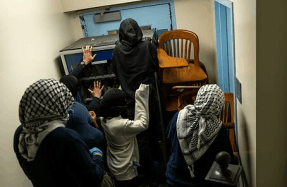'Dear Dickie': A Window Into Family History Through Post-WWII Love Letters
Sara Kehaulani Goo's father recently discovered the 28 letters, written from 1946 to 1947, stashed in a wooden box hidden at the bottom of a chest in her late grandparents' bedroom.
by Sara Kehaulani Goo
Jul 26, 2017
4 minutes

"Dear Dickie," the woman wrote on thin parchment paper. "Here I am, so please don't scold me ..."
The Jan. 2, 1947, letter had made its journey from Honolulu to Kobe, Japan, courtesy of a 5-cent airmail stamp — evidence of an overseas courtship between two young people. She began with an apology for not writing sooner but quickly eased into flirting and teasing, anticipating the day when they would see each other again.
The author —my grandmother Martha Kekauililani Matsuda — was just turning 20 years old and writing every other week for a year to a man stationed in Japan as part of the U.S. occupation after World War II. They would marry two years after
You’re reading a preview, subscribe to read more.
Start your free 30 days





